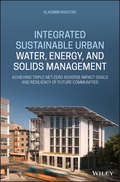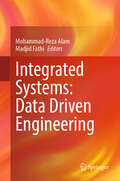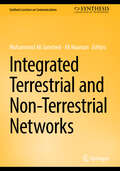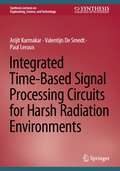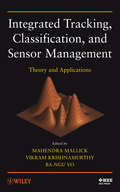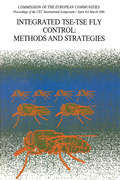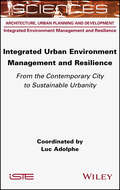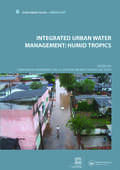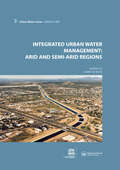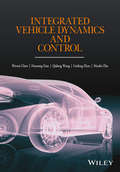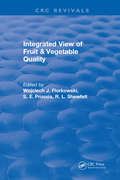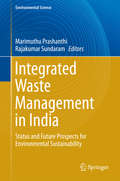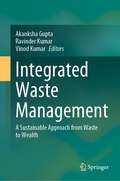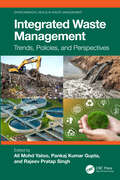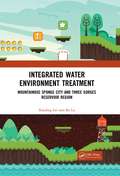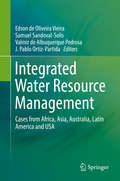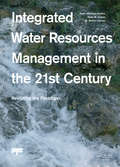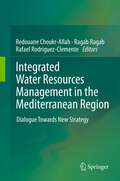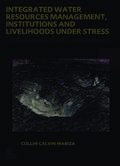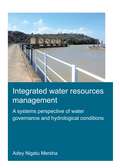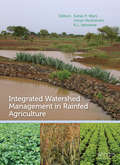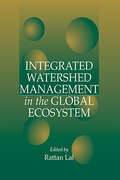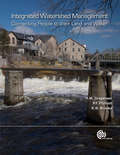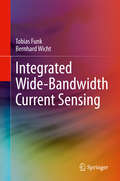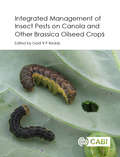- Table View
- List View
Integrated Sustainable Urban Water, Energy, and Solids Management: Achieving Triple Net-Zero Adverse Impact Goals and Resiliency of Future Communities
by Vladimir NovotnyA guide for urban areas to achieve sustainability by recovering water, energy, and solids Integrated Sustainable Urban Water, Energy, and Solids Management presents an integrated and sustainable system of urban water, used (waste) water, and waste solids management that would save and protect water quality, recover energy and other resources from used water and waste solids including plastics, and minimize or eliminate the need for landfills. The author—a noted expert on the topic—explains how to accomplish sustainability with drainage infrastructures connected to receiving waters that protect or mimic nature and are resilient to natural and anthropogenic stresses, including extreme events. The book shows how to reduce emissions of greenhouse gasses to net zero level through water conservation, recycling, and generating blue and green energy from waste by emerging emission free technologies while simultaneously installing solar power on houses and wind power in communities. Water conservation and stormwater capture can provide good water quality for diverse applications from natural and reclaimed water to blue and green energy and other resources for use by present and future generations. This important book: Considers municipal solid waste as an ongoing source of energy and resources that will eliminate the need for landfills and can be processed along with used water Presents an integrated approach to urban sustainability Offers an approach for reducing greenhouse gas emissions by communities to net zero Written for students, urban planners, managers, and waste management professionals, Integrated Sustainable Urban Water, Energy, and Solids Management is a must-have guide for achieving sustainable integrated water, energy, and resource recovery in urban areas.
Integrated Systems: Data Driven Engineering
by Madjid Fathi Mohammad-Reza AlamThe term "integrated system" denotes the seamless collaboration of numerous (potentially unrelated) subsystems to achieve a specific goal. It involves combining various components—hardware, software, networks, and workflows—into a unified system that operates cohesively. Widely utilized across scientific and technological domains, integrated systems aim to elevate coherence, efficiency, and overall functionality quality. The Integrated System Design and Technology (ISDT) conference convenes a distinguished group of leading scientists with diverse backgrounds and notable achievements in technological innovation with the goal of fostering cross-disciplinary research and innovation. This gathering serves as an enabler for addressing major scientific and societal challenges that necessitate integrated systems, emphasizing the importance of collaboration in overcoming complex issues. The book at hand includes peer-reviewed research results that were presented and critically discussed duringthe ISDT 2023 which were held in Antalya, Turkey, in May 2023.
Integrated Terrestrial and Non-Terrestrial Networks (Synthesis Lectures on Communications)
by Muhammad Ali Jamshed Ali NaumanThis book aims to address a wide range of topics in wireless/satellite communications to tackle the issues related to the integration of terrestrial networks (TN) with non-terrestrial networks (NTN). In Release 17, the third-generation partnership project (3GPP) proposed the standardization of NTN to allow 5G-based TN to support NTN. According to Release 17, the NTN will consist of satellites, with unmanned aerial vehicles (UAVs) and high-altitude platforms (HAPs) regarded as specific use cases of NTN. Similar to the Global Positioning System (GPS), signals based on NTN are unable to provide indoor coverage, as these signals are attenuated and scattered by roofs, walls, etc. Moreover, power and delay are critical factors that restrict a cellular-enabled mobile handset from achieving reliability, seamless coverage, and low latency while relying on NTN. This book has brought together multidisciplinary contributors in the field of wireless/satellite communications to identify and present technical challenges and recent results related to the design of energy-efficient, delay-tolerant, and enhanced coverage-based integrated TN and NTN. Given that challenges and future aspects are also considered, the book covers a wide variety of subject categories and would therefore benefit a larger readership in the scientific community.
Integrated Time-Based Signal Processing Circuits for Harsh Radiation Environments (Synthesis Lectures on Engineering, Science, and Technology)
by Paul Leroux Valentijn De Smedt Arijit KarmakarThis book covers the most recent, advanced methods for designing mixed-signal integrated circuits, for radiation-hardened sensor readouts (capacitive) and frequency synthesizers (quadrature, digitally controlled oscillators and all-digital PLL etc.). The authors discuss the ionizing radiation sources, complex failure mechanisms as well as several mitigation strategies for avoiding such failures. Readers will benefit from an introduction to the essential theory and fundamentals of ionizing radiation and time-based signal processing, with the details of the implementation of several radiation-hardened IC prototypes. The radiation-hardening methods and solutions described are supported by theory and experimental data with, underlying tradeoffs.Discusses the basics of time-based signal processing and its effectiveness in mitigating ionizing radiationProvides mitigation strategies and recommendations for reducing radiation induced effects in Integrated CircuitsIncludes coverage of devices used in measuring radiation, focusing on semiconductor-based radiation sensors
Integrated Tracking, Classification, and Sensor Management
by Vikram Krishnamurthy Ba-Ngu Vo Mahendra MallickA unique guide to the state of the art of tracking, classification, and sensor managementThis book addresses the tremendous progress made over the last few decades in algorithm development and mathematical analysis for filtering, multi-target multi-sensor tracking, sensor management and control, and target classification. It provides for the first time an integrated treatment of these advanced topics, complete with careful mathematical formulation, clear description of the theory, and real-world applications.Written by experts in the field, Integrated Tracking, Classification, and Sensor Management provides readers with easy access to key Bayesian modeling and filtering methods, multi-target tracking approaches, target classification procedures, and large scale sensor management problem-solving techniques. Features include:An accessible coverage of random finite set based multi-target filtering algorithms such as the Probability Hypothesis Density filters and multi-Bernoulli filters with focus on problem solvingA succinct overview of the track-oriented MHT that comprehensively collates all significant developments in filtering and trackingA state-of-the-art algorithm for hybrid Bayesian network (BN) inference that is efficient and scalable for complex classification modelsNew structural results in stochastic sensor scheduling and algorithms for dynamic sensor scheduling and managementCoverage of the posterior Cramer-Rao lower bound (PCRLB) for target tracking and sensor managementInsight into cutting-edge military and civilian applications, including intelligence, surveillance, and reconnaissance (ISR)With its emphasis on the latest research results, Integrated Tracking, Classification, and Sensor Management is an invaluable guide for researchers and practitioners in statistical signal processing, radar systems, operations research, and control theory.
Integrated Tse-tse Fly Control: Proceedings Of The Cec International Symposium/ispra 4-6 March 1986
by R. CavalloroThis book discusses methods which might appropriately be employed under various circumstances. It is concerned with control of insect pests and tse-tse flies, and considers prospects for integrated control of the African trypanosomiases, in which vector control is envisaged as playing a key role.
Integrated Urban Environment Management and Resilience: From the Contemporary City to Sustainable Urbanity
by Luc AdolpheIntegrated Urban Water Management: UNESCO-IHP (Urban Water Series)
by Jonathan N Parkinson; Joel A. Goldenfum Carlos E.M.TucciExcess water in the urban environment results in flooding,which causes structural damage, risks to personal safety and disruption to city life. Water is also a major contributory factor for disease transmission as well as being the medium for transport of many pollutants. These problems are of increasing concern due to climate changes and are parti
Integrated Urban Water Management: UNESCO-IHP (Urban Water Series)
by Larry W. MaysThe Integrated Urban Water Management (IUWM) is an emerging approach to managing the entire urban water cycle in an integrated way, which is key to achieving the sustainability of urban water resources and services. An examination of integrated management of water resources in urban settings, this book focuses on issues specific to arid and semi-arid regions. It provides an overview of the various aspects of IUWM in arid and semi-arid regions, emphasizing water supply technologies such as artificial recharge, water transfers, desalination, and rainfall harvesting. The book discusses water excess management in the context of the stormwater and the floodplain management systems. It includes case studies from developed and developing countries that underline the needs and challenges of water management in urban environments in arid and semi-arid regions around the world.
Integrated Vehicle Dynamics and Control
by Wuwei Chen Qidong Wang Hansong Xiao Linfeng Zhao Maofei ZhuA comprehensive overview of integrated vehicle system dynamics exploring the fundamentals and new and emerging developments This book provides a comprehensive coverage of vehicle system dynamics and control, particularly in the area of integrated vehicle dynamics control. The book consists of two parts, (1) development of individual vehicle system dynamic model and control methodology; and (2) development of integrated vehicle dynamic model and control methodology. The first part focuses on investigating vehicle system dynamics and control according to the three directions of vehicle motions, including longitudinal, vertical, and lateral. Corresponding individual control systems, e.g. Anti-lock Brake System (ABS), Active Suspension, Electric Power Steering System (EPS), are introduced and developed respectively. Particular attention is paid in the second part of the book to develop integrated vehicle dynamic control system. Integrated vehicle dynamics control system is an advanced system that coordinates all the chassis control systems and components to improve the overall vehicle performance including safety, comfort, and economy. Integrated vehicle dynamics control has been an important research topic in the area of vehicle dynamics and control over the past two decades. The research topic on integrated vehicle dynamics control is investigated comprehensively and intensively in the book through both theoretical analysis and experimental study. In this part, two types of control architectures, i.e. centralized and multi-layer, have been developed and compared to demonstrate their advantages and disadvantages. Integrated vehicle dynamics control is a hot topic in automotive research; this is one of the few books to address both theory and practice of integrated systems Comprehensively explores the research area of integrated vehicle dynamics and control through both theoretical analysis and experimental study Addresses a full range of vehicle system topics including tyre dynamics, chassis systems, control architecture, 4 wheel steering system and design of control systems using Linear Matrix Inequality (LMI) Method
Integrated View of Fruit and Vegetable Quality
by Wojciech J FlorkowskiThis book focuses on quality of produce by addressing its various aspects. By applying a disciplinary perspective, we work toward an integrated view, placing papers in the broader context of the processes that are responsible for the supply of fresh produce. While a number of technical papers focus on factors affecting quality, policy issues are also discussed. Several papers link the market performance with the ability of the existing institutional structures to provide incentives to supply the optimal quality produce. The topics covered in this contributed volume address quality issues ranging from cultural practices to postharvest handling, retailing, and home consumption. Perspectives of horticulturists, agronomists, food scientists, engineers, and economists should be looked upon as a system applied to solve practical problems faced by scientists, the produce industry, and policy makers. The immediate benefit of this book is improved understanding of specific quality issues and marketing problems, while suggesting the need for a multidisciplinary approach for optimal solutions. This book is of interest to horticulturists, agronomists, food scientists, engineers, and economists, as well as the produce industry, and policy makers in food quality and safety.
Integrated Waste Management in India
by Marimuthu Prashanthi Rajakumar SundaramThis book provides insights into the current status of waste management in India and research approaches to minimize waste and convert useful waste into energy alternatives towards achieving environmental sustainability. It also discusses the implications of waste on human health and approaches to minimize the burden. Waste disposal, especially municipal solid waste (MSW), is one of the major environmental problems facing Indian cities. Inadequate management of MSW poses risks to inhabitants and is also a breeding ground for various diseases. Environmental health and the impact of waste on health is another major topic that has to be addressed. In India, non-governmental organizations (NGOs) and social welfare groups play a major role in collecting and managing waste. However, waste management is still a huge problem and has also expanded into rural areas. Contributed research papers from academic studies and industry focus on applied waste-management methods currently being practiced, waste strategies and ecofriendly approaches such as bioremediation. The outcomes of the research contributions in the book will be useful in implementing and developing a task force to combat the waste-management and energy-demand crises.
Integrated Waste Management: A Sustainable Approach from Waste to Wealth
by Ravinder Kumar Vinod Kumar Akanksha GuptaThis book explores a diverse spectrum of waste materials, encompassing industrial hazardous and non-hazardous waste, agricultural waste, biomass waste, radioactive waste, municipal solid and liquid waste, as well as e-waste, and investigates their adverse impacts on the environment. It is an exciting exploration of various approaches to waste management, highlighting the importance of adopting sustainable practices such as the 7Rs principle, utilization of nanomaterials and photocatalysis, zero waste management techniques, recycling and upcycling techniques, and IoT-enabled strategies. It provides a critical assessment of the challenges and opportunities in transforming waste into value-added products for the industry. This book is designed to provide constructive insights for researchers, environmentalists, policy makers and professionals engaged in enhancing waste management, fuelling the circular economy, and paving the way for a sustainable future.
Integrated Waste Management: Trends, Policies, and Perspectives (Environmental Nexus in Waste Management)
by Rajeev Pratap Singh Pankaj Kumar Gupta Ali Mohd YatooThis book addresses multiple focus areas identified and provides solutions with respect to the circular economy, water pollution, potable water availability, reducing population impact on the environment, and better health by integrated waste management. It explains techniques to handle waste generation, characterization, minimization, collection, separation, treatment, and disposal, and includes chapters that address waste management policy, education, and economic and environmental assessments.Features: Introduces waste management, pollution, and toxicity profile of potentially toxic environmental contaminants and industrial wastes. Describes field studies on the application of microbes and plants in bio/phytoremediation of environmental contaminants/industrial wastes. Reviews eco-friendly remediation techniques such as phytoremediation, vermi-remediation, nano-remediation, and myco-remediation. Presents recent advances and challenges in bioremediation research and applications in environmental management. Details underlying tools and techniques for sustainable waste management and (nature-based) solutions in each chapter. This book is aimed at graduate students and researchers in environmental engineering and waste management.
Integrated Water Environment Treatment: Mountainous Sponge City and Three Gorges Reservoir Region
by Bo Lu Xiaoling LeiWith the rapid development of Chinese urbanization in the 21st century, "urban diseases" become more serious, mainly manifested in water environmental pollution, urban flooding, water shortage, and deterioration of water ecology. It is necessary to establish a modern rainwater management system, scientifically solve the problem of excess urban rainwater and to improve water environment quality. Improvement of water environment quality is conducive to the ecological function of a sponge city. Sponge city construction has contributed to control non-point source pollution. Sponge systems cause the stagnation and purification of rainwater runoff, which is an important guarantee for water environment quality. This monograph summarizes theories and practices of the integrated water environment treatment in Chongqing, a typical representative mountainous city in the Three Gorges Reservoir Region. Based on the mountainous terrain and unique water environment characteristics in the Three Gorges Reservoir Region, the monograph analyzes measures and difficulties in the basin water environment integrated treatment. Moreover, the monograph makes suggestions for risk management amid drainage systems during the COVID-19 epidemic.
Integrated Water Resource Management: Cases from Africa, Asia, Australia, Latin America and USA
by Edson De Vieira Samuel Sandoval-Solis Valmir De Pedrosa J. Pablo Ortiz-PartidaThis book presents case studies that share important experiences regarding Integrated Water Resource Management (IWRM) in various countries. Following an introduction to theoretical concepts, responsibilities, and challenges, the subsequent chapters address, among other topics, an analysis of policies and regulations for water management in Brazil, the drivers that led California to adapt to the IWRM framework, and the international regulations for water markets and water banking in Australia and Chile. The implications of climate change for water resource systems in Mexico are discussed, as well as management strategies from California that could potentially serve as IWRM adaptation schemes in Mexico. Critical cases from Guanacaste (Costa Rica), and from Zayandehrud River Basin and Lake Urmia (Iran) are reviewed in terms of management practices and solutions. The book also provides an overview of the current availability and use of water resources in South Korea, and discusses the management of and international water law instruments for transboundary groundwater in Africa.
Integrated Water Resources Management in the 21st Century: Revisiting the paradigm
by Maite M. Aldaya M. Ramón Llamas Pedro Martinez-SantosIntegrated water resources management (IWRM) advocates a coordinated approach for managing water resources in a way that balances social and economic needs with care for nature. While attractive, IWRM is both controversial and elusive. This book provides a down-to-earth approach to the elusive concept of integrated water resources management, drawing from conceptual frameworks and real-life practice to identify the key aspects that are yet to be resolved, it examines the role of water accounting, food trade, environmental externalities and intangible values as key aspects whose resolution will help the IWRM community move forward.
Integrated Water Resources Management in the Mediterranean Region
by Rafael Rodriguez-Clemente Ragab Ragab Redouane Choukr-AllahThis book puts great emphasis on the importance of Integrated Water Resources Management IWRM as the way forward towards food, water, and energy security. It offers better ways and means of managing the limited water resources; using water more efficiently; adopting new policies in order to cope with climate change and drought; increase water supply through the use of non conventional water resources, especially waste water; inducing stakeholders participation and information exchange and raise public awareness to the value of water. It is an important book for all those involved in all aspects of water resources and contains valuable information for scientists, researchers, farmers, extension services and students.
Integrated Water Resources Management, Institutions and Livelihoods under Stress: Bottom-up Perspectives from Zimbabwe; UNESCO-IHE PhD Thesis (IHE Delft PhD Thesis Series)
by Collin C. MabizaThe majority of people in Limpopo river basin depend on rainfed agriculture. Unfortunately the Limpopo is water scarce, and parts of the basin, such as Zimbabwe's Mzingwane catchment, are under stress in terms of agro-ecological and socio-politicoeconomic conditions. Integrated Water Resources Management (IWRM) has been adopted in the river basin i
Integrated Water Resources Management: Integrated Water Resources Management (IHE Delft PhD Thesis Series)
by Adey NIgatu MershaThis thesis presents analysis of the status of IWRM implementation along with the challenges with regards to policy and institutional measures as well as the required basin information and management instruments. The research entailed a detailed analysis of water resources systems based on a case study from the Awash River Basin in Ethiopia, covering the historical and present state of the challenges and gaps in policies, institutional arrangements and management instruments. The status quo of practical water management, implications of plausible management alternatives in terms of their impact to future water availability, demand fulfilment, patterns of use, and sustainability of the environment were examined. Moreover, the interlinkages and dynamics between key water dependent resources sectors, broadly categorized into water, energy, food, and ecosystems (WEFE) was explored to identify key tradeoffs and synergies. This was deliberated as to improving the synchronization of sectoral plans and resources management programs, thereby fast-tracking the coordination process in IWRM. Overall, the research provides a clearer understanding of the system-wide problems, structural challenges and possible future consequences regarding the management and sustainability of the entire water resource system. Ultimately the purpose is to set in motion new strategies and mechanisms to improve the implementation of the currently applied IWRM framework in the context of the SDGs.
Integrated Watershed Management in Rainfed Agriculture
by Suhas P. Wani Johan Rockstrom Kanwar Lal SahrawatThis book provides a comprehensive presentation of the realization of improved rain fed agriculture yield in semi-arid and dry land areas. Besides techniques to improve the livelihood of small-scale farmers in developing countries, it includes examples and case studies for further support. The methods discussed have shown to be successful and economically remunerative in India and various African countries. Intended for professionals (investors, policy makers), researchers and (post)graduate students working on dry land and sustainable agriculture and water and natural resources management. Suited for courses in dry land agriculture, soil / water management and watershed development.
Integrated Watershed Management in the Global Ecosystem
by Rattan LalFocusing on the technical, social, and economic issues involved in watershed management, this interdisciplinary author team focuses on bettering land use practices and the condition of soil water resources.Integrated Watershed Management in the Global Ecosystem is a volume composed from an international symposium of the world's leading experts
Integrated Watershed Management: Connecting People to Their Land and Water
by Kenneth N. Brooks Hans M. Gregersen Peter F. FolliottGregersen, Folliott, and Brooks provide government agencies and other bodies with background information, factors to be considered, and procedures that facilitate organizing and guiding land and water use in concert with one another. The book can also serve as a reference for planning, monitoring, and implementing development efforts and natural resource management using the integrated watershed management approach. Annotation ©2008 Book News, Inc., Portland, OR (booknews.com)
Integrated Wide-Bandwidth Current Sensing
by Tobias Funk Bernhard WichtThis book provides readers with a single-source reference to current sensing integrated circuit design. It is written in handbook style, including systematic guidelines and implementation examples. The authors focus on the implementation of wide-bandwidth current sensing on a single microchip, toward usage in applications such as sensing, control and optimization of the energy flow in growth areas like industrial electronics, renewable energies, smart grids, electromobility and the Internet of Things.Provides readers with a comprehensive, all-in-one source for current sensing integrated circuit design, including implementation examples;Discusses modeling and optimization of on-chip Rogowski coil and Hall sensor in both lateral and vertical orientation;Includes noise reduction techniques, such as auto-zeroing and chopping;Covers open-loop and closed-loop sensor front-end design;Presents the first on-chip current sensor with a planar coil placed besides a power line to measure internal signal currents and the first off-chip current sensor with a helix-shaped coil for external signal currents in the multi-MHz region.
Integrated management of Insect Pests on Canola and other Brassica Oilseed Crops
by Tao Li Peter Mason Kevin D Floate John Gavloski Hector Cárcamo Matthew P. Hill Harit K Bal Ronald E Batallas Tulsi Bhardwaj James D Blande Dhana Raj Boina G David Buntin Randall Brandt Surendra Dara Tim J Dumonceaux Robert H Elliott Maya Evenden Yaghoub Fathipour Kristopher L Giles Larry Grenkow Parwinder Grewal Rebecca H Hallett Vincent A Hervet Sari J. Himanen Heikki M.T. Hokkanen Jarmo K Holopainen Prashant Jha Janet J Knodel Sarina Macfadyen Ingeborg Menzler-Hokkanen Mohammad Ali Mirhosseini Christine Noronha Chrystel Olivier Francisco Rubén Badenes-Pérez S. Jesu Rajan Tom Royer Muhammad Sarwar Barbara Sharanowski Govinda Shrestha Juliana Soroka Rajagopalbabu Srinivasan Raj Kumar Thakur Sally Vail Leyun Wang R W Wanigasekara Chaminda De Weeraddana Tyler J Wist Zi-Hua ZhaoThis book comprehensively reviews current pest management practices and explores novel integrated pest management strategies in Brassica oilseed crops. It is essential reading for pest management practitioners and researchers working on pest management in canola and other Brassica crops worldwide. Canola, mustard, camelina and crambe are the most important oilseed crops in the world. Canola is the second largest oilseed crop in the world providing 13% of the world's supply. Seeds of these species commonly contain 40% or more oil and produce meals with 35 to 40% protein. However, its production has declined significantly in recent years due to insect pest problems. The canola pest complexes are responsible for high insecticide applications on canola. Many growers rely on calendar-based spraying schedules for insecticide applications. The diamondback moth Plutella xylostella and flea beetles Phyllotreta spp. (P. cruciferae and P. striolata)cause serious damage to canola. In the Northern Great Plains, USA, for instance, P. xylostella is now recorded everywhere that canola is grown. Severe damage to canola plants can be caused by overwintering populations of flea beetles feeding on newly emerged seedlings. Cabbage seed pod weevil (Ceutorhynchus obstrictus), swede midge (Contarinia nasturtii), and tarnished plant bug (Lygus lineolaris) are also severe pests on canola. Minor pests include aphids (cabbage aphid, Brevicoryne brassicae and turnip aphid, Hyadaphis erysimi) and grasshopper, Melanoplus sanguinipes. This book: · is the only single compiled source of information on integrated management of canola and other Brassica oilseed pests · presents the biology and management of all the major and minor pests of Brassica oilseed crops · is an essential source of information for applied entomologists, crop protection researchers, extension agents and stakeholders
